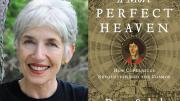By his thirties, Nicolaus Copernicus had developed a theory that would turn the universe inside out, but for three decades, he kept his ideas almost entirely to himself. As a young man, he had formulated a mathematical model that placed the sun, rather than the earth, at the center of the solar system. To friends and colleagues, he promised a manuscript detailing his revolutionary ideas, yet decades later, perhaps wary of how those ideas would be received, he had published only a few tantalizing glimpses.
His groundbreaking work might have been lost but for a fortuitous meeting when Copernicus was in his mid sixties. “A young man came to see him and talked him into doing what he had avoided doing for a lifetime,” said writer Dava Sobel in a talk Thursday evening at the Harvard-Smithsonian Center for Astrophysics on its monthly observatory night. “That really fascinated me.” In her most recent book, A More Perfect Heaven: How Copernicus Revolutionized the Cosmos, released in 2011, Sobel used a combination of drama and nonfiction narrative to imagine the events that convinced Copernicus to publish his lifework, De revolutionibus orbium coelestium. “Everyone knew that this meeting had taken place,” she said, “but no one knew what they had said to each other.”
Before a packed audience, Sobel presented excerpts from the book’s centerpiece, a play titled And the Sun Stood Still, reading the part of young mathematician Georg Joachim Rheticus (the play debuts today in Boulder, Colorado). In her fictional account, Copernicus—read by renowned Copernicus scholar Owen Gingerich, professor of astronomy and of the history of science emeritus—has built a “world machine” that embodies his heliocentric model. Rheticus, spinning in a chair at the machine’s center, believes he sees the stars move around him even though in reality, he is the body in motion. His experience prompts the two to discuss Copernicus’s radical ideas. “You mean, you really do mean to turn the earth!” Rheticus exclaims in astonishment. Foreshadowing the reaction of their contemporary scientific community, the younger man initially declares, “I came here in good faith, and what do I find? A lunatic! A deluded—a, a recluse, obsessed with an insane idea!”
History, at least, shows that both Copernicus’s theory and Rheticus’s persuasion prevailed in the end. With the younger man’s help, Copernicus finished his monumental book in the last years of his life; legend has it, in fact, that after seeing his completed manuscript, he died peacefully the same day. In closing, Sobel reflected on Copernicus’s legacy. “It depends how you look at him. Is he the great diminisher, who took us out of the center? But what is the center really?” she asked. “If, as we are told by astronomers today, everything we see in the universe, everything that’s light, is really only about 4 percent of what’s there, where does that leave us? We are either insignificant—or extremely special.”
See also “The Copernicus Quest,” describing Owen Gingerich’s mission to examine all extant copies of the first and second editions of Copernicus’s masterpiece, detailed in Gingerich’s 2005 book, The Book Nobody Read: Chasing the Revolutions of Nicolaus Copernicus.








